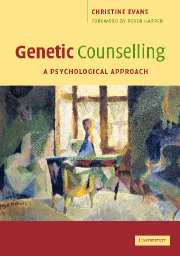Book contents
- Frontmatter
- Contents
- Acknowledgements
- Foreword
- Preface
- 1 An overview of genetic counselling
- 2 The psychological processes underlying genetic counselling
- 3 Understanding individual difference in genetic counselling using attachment theory
- 4 The role and skills of the counsellor and ideas from psychotherapy
- 5 Examples of the role and skills of the counsellor
- 6 The gene and the family system
- 7 Working with parents and children
- 8 The influence of the nature of the disorder on the consultation
- 9 The effect on the counsellor
- 10 The interview and non-directiveness
- References
- Index
Foreword
Published online by Cambridge University Press: 12 August 2009
- Frontmatter
- Contents
- Acknowledgements
- Foreword
- Preface
- 1 An overview of genetic counselling
- 2 The psychological processes underlying genetic counselling
- 3 Understanding individual difference in genetic counselling using attachment theory
- 4 The role and skills of the counsellor and ideas from psychotherapy
- 5 Examples of the role and skills of the counsellor
- 6 The gene and the family system
- 7 Working with parents and children
- 8 The influence of the nature of the disorder on the consultation
- 9 The effect on the counsellor
- 10 The interview and non-directiveness
- References
- Index
Summary
Conversation and communication lie at the heart of genetic counselling. How well we are able to communicate will to a large extent determine how successful we are in providing answers to the questions and problems posed by those whom we see in genetic counselling practice. We hope and believe that we are already skilful in the processes involved but, at the same time, most of us recognise that we could do much better and can think of many occasions when we have been left with a sense of inadequacy, or even failure.
This book will be of great support to all involved in genetic counselling, giving both general and specific information that relates directly to its practice. The general themes explored will be especially helpful to those many people whose training has involved little theoretical knowledge of psychology and psychotherapy. By exploring this general background, notably attachment theory, in the specific context of genetic counselling, Christine Evans introduces the reader gently to the concepts involved. As a result, one comes to understand the fuller significance of factors that most of us have already intuitively recognised, but have not been able to name or relate to general principles. As she states in her preface, ‘It is a way of giving back to the world of genetics what actually belongs to it’.
- Type
- Chapter
- Information
- Genetic CounsellingA Psychological Approach, pp. xi - xivPublisher: Cambridge University PressPrint publication year: 2006

